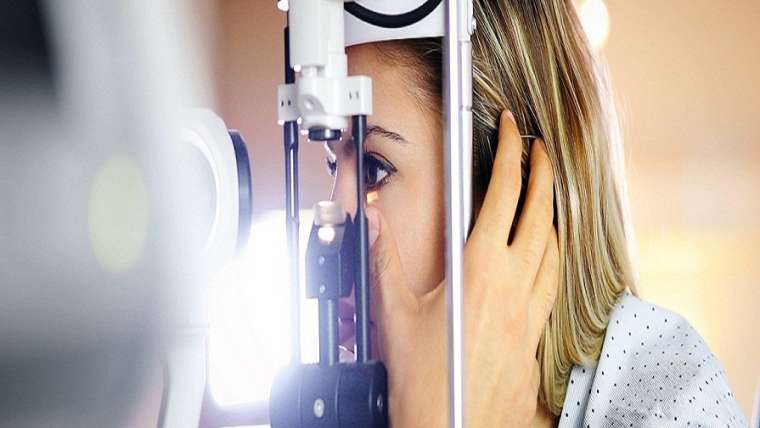Eating the right foods can protect your vision and keep you healthy. Research says that foods rich in vitamins C and E, zinc, lutein, zeaxanthin, and omega-3 fatty acids are linked to lower risk for age-related macular degeneration (AMD), cataract and perhaps even dry eye later in life.
But what does this nutrient-rich diet look like? Let’s break it down:
- Vitamin C. Foods with lots of vitamin c are oranges, grapefruit, kiwifruit, strawberries, tomatoes, red and green peppers, and broccoli.
- Vitamin E. Healthy sources of vitamin E include almonds, sunflower seeds, olive oil, and avocadoes.
- Zinc. Legumes (beans and lentils), seeds, meat/seafood, dairy, and eggs are all good sources of zinc.
- Lutein and zeaxanthin. Both of these nutrients are found naturally in the retina—the light-sensitive tissue lining the back of the eye. This is why boosting your diet with lutein and zeaxanthin is a win for your eye health. Lutein and zeaxanthin—often found together in many foods—are part of the “carotenoid” family of plant pigments. Carotenoids give colour to many vegetables and fruits. You can find lutein and zeaxanthin in leafy green vegetables like kale, spinach, and swiss chard. Broccoli, asparagus, and colourful fruits like raspberries, papaya, peaches, and mangoes are also chock-full of eye-healthy carotenoids.
Cataract prevention in the produce aisle
Did you know that regularly enjoying a piece of fruit and a side of vegetables can help prevent vision loss from cataracts? Studies show that a diet rich in foods with antioxidants may reduce your risk of developing cataracts.
But what are antioxidants?
Put simply, antioxidants are foods that keep us healthy by delaying or slowing down oxidation, which causes ageing or cell death. Oxidation can lead to cataracts by causing changes to fats and proteins in the eye’s lens, making the lens cloudy.
What foods are antioxidants?
Foods are rich in vitamins A, C and E, carotenoids, lutein and zeaxanthin, and selenium (pasta, bread and grains) all help protect our cells from damage.
While you can get supplements in pill form at the drug store, antioxidants are most beneficial when consumed organically from fruits and vegetables and other whole foods. Studies show that antioxidant supplements do not help prevent cataracts.
Supplements may even be harmful. For example, high-dose beta-carotene supplements have been shown to increase the risk of lung cancer in smokers and former smokers. High-dose vitamin E supplements increase the risk of hemorrhagic stroke (stroke caused by bleeding in the brain) and prostate cancer. So load up on fresh veggies and delicious fruits—not on high-dose supplements—knowing you are doing your eyes and your health a favour.
The Mediterranean diet
The Mediterranean diet is named after the eating habits of those living near the Mediterranean Sea. Studies show the plant- and seafood-based diet may reduce your risk of heart disease and age-related macular degeneration (AMD).
The Mediterranean diet includes:
- green leafy vegetables and colourful fruits
- tree nuts like almonds, cashews and walnuts
- seafood as your primary meat source
- healthy fats. Choose olive oil over butter
- whole grain bread, cereal, and pasta
- lots of herbs and spices added to your food to lower your salt intake
- a moderate amount of dairy (yoghurt and cheese) and eggs
Those from the region also enjoy a glass of red wine with dinner, which has its own health benefits (in moderation). So there is some truth to a toast of Salute (to your health)!
Low-glycemic index diet
People who have or are at risk for diabetes or age-related macular degeneration (AMD) can benefit by following a low-glycemic index (low-GI) diet.
With diabetes, blood sugar levels can get too high, which causes serious health problems and can lead to vision loss. Some foods cause rapid spikes in blood sugar (high GI) and others raise blood sugar more moderately (low GI). You can avoid quick blood sugar spikes with low-GI food swaps:
- Oatmeal or muesli over sweetened breakfast cereal
- Brown rice over white rice
- Whole-grain bread over white bread
- Durum wheat pasta or sweet potato over a baked potato
- Nuts over potato chips
Healthy fats for dry eye
A dry eye is when the eyes do not produce enough tears to keep them lubricated and comfortable. Artificial tears and medication are very helpful, but adding omega-3 and omega-6 fatty acids to your diet may also provide relief.
Omega-3 fatty acids are found in oily fish (like salmon, trout and sardines). Nuts and oils like walnuts and sunflower oil are great natural sources of omega-6 fatty acids. Both are available as oral supplements (pills or tablets). Ask your doctor if omega-3 and omega-6 supplements are right for you.
Fish can lower AMD-risk
Studies found that women who ate fish high in omega-3 fatty acids at least twice a week were less likely to get age-related macular degeneration (AMD).
Fish is also good for your heart. The American Heart Association recommends that healthy adults eat fish at least twice a week. Some fish contain high mercury levels and should be eaten sparingly or avoided completely during pregnancy. Talk to your doctor about what fish is and how much is healthy to eat if you are pregnant or become pregnant.
Calcium and AMD
Earlier studies suggested that calcium lowered the risk of developing AMD but newer research is uncertain. Emily Chew, MD, a researcher at the National Eye Institute, explains why and clarifies the role of calcium in your eye and overall health.
AREDS2 formula for AMD
People with certain forms of AMD may be able to slow the progression of the disease to an advanced form by taking the AREDS2 supplements. This formula—developed from the Age-Related Eye Diseases Study (AREDS)—includes:
- Vitamin C (500 mg)
- Vitamin E (400 IU)
- Lutein (10 mg)
- Zeaxanthin (2 mg)
- Zinc oxide (80 mg) and
- Copper oxide (2 mg)
AREDS2 study also looked at whether adding omega-3 fatty acids found in fish oil, specifically DHA and EPA, to the above ingredients further lowers the risk of AMD progression and found no additional benefit. Moreover, the AREDS studies found no prevention or slowing down of cataract progression by these supplements.
Before stocking up on these supplements, be sure to talk with your ophthalmologist to learn if they are recommended for you. Some people should not take large doses of antioxidants or zinc for medical reasons.
As you think about ways to improve your eye health, remember: vitamins and nutritional supplements are not a cure for eye disease, nor will they give you back vision that you may have already lost. But good nutrition at all ages is vital for your entire body and plays an important role in maintaining healthy eyes. Talk with your ophthalmologist about any concerns you have about your eye health
The Benefits of Fish Oil for Dry Eye
Our eyes need a healthy coating of tears. Without this lubrication, our eyes become red, scratchy and irritable. This can lead to a condition called dry eye.
The dry eye becomes more common with age. Some women develop dry eye during menopause, due to hormonal changes. Other people develop dry eyes from living in a windy, dry environment or working in a building with constant air conditioning. Exposure to sun, tobacco smoke or cold or allergy medicines can also lead to dry eye.
What are the benefits of omega-3 fatty acids?
While artificial tears and ointments are the most common treatments for dry eye, some patients find relief from consuming omega-3 fatty acids, according to the National Eye Institute. Omega-3s are available in capsule form and can be consumed naturally by eating salmon, sardines, herring, tuna, menhaden or cod liver.
A sweeping study of 32,000 women found those who consumed the most omega-3 fats from fish had a 17% lower risk of dry eye compared with women who ate little or no seafood. And a study in the International Journal of Ophthalmology concluded omega-3 fatty acids “have a definite role for dry eye syndrome.”
Fish oil may help soothe dry eyes
The omega-3s in fish oil seems to reduce inflammation. If inflammation of the eyelids or surfaces of the eye worsens dry eye, it makes sense that a supplement could help the problem. Omega-3 oils also appear to improve function in the eye’s meibomian glands, which produce the oily part of tears. Improved function of those glands can ease dry eye symptoms.
Patients with other eye diseases may benefit as well. Omega-3s may reduce the growth of abnormal blood vessels that occur in age-related macular degeneration and other retinal diseases.
Which fish oil supplement is best?
Some people prefer to consume omega-3 fatty acids by eating fish, while others prefer to swallow a fish oil capsule.
Ask your doctor if omega-3 supplements are right for you. If so, your doctor can help you select the best quality supplement from the many options available in stores.


